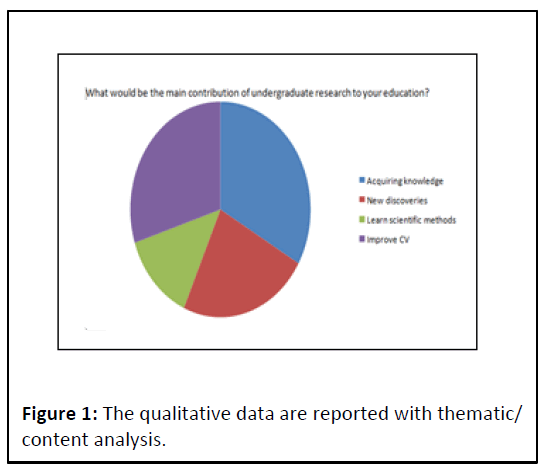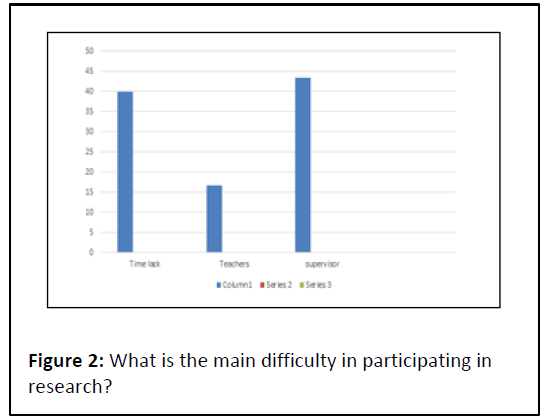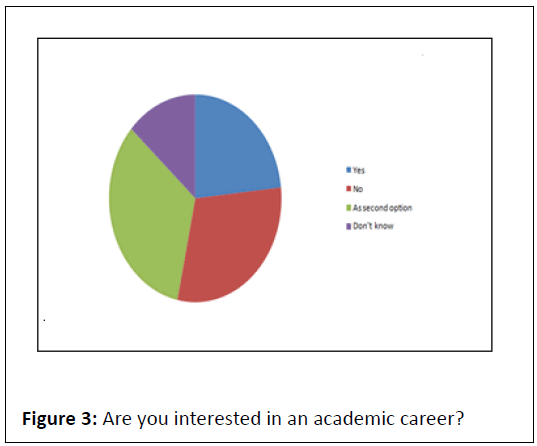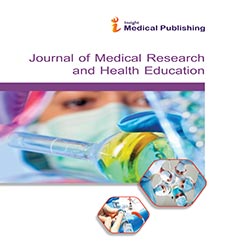Undergraduate Research in Medical Curriculum: Student's Perspective
Masaraf Hussain1*, Yookarin Khonglah2 and Yasmeen Hynniewta3
1Department of Neurology, AIIMS, Guwahati, India
2Department of Pathology, NEIGRIHMS, Shillong, India
3Department of Medicine, NEIGRIHMS, Shillong, India
- *Corresponding Author:
- Masaraf Hussain
Department of Neurology, AIIMS, Guwahati,
India,
E-mail: masarafhussain74@gmail.com
Received date: December 19, 2022, Manuscript No. IPJMRHE-22-15435; Editor assigned date: December 21, 2022, PreQC No. IPJMRHE-22-15435 (PQ); Reviewed date: January 03, 2023, QC No. IPJMRHE-22-15435; Revised date: January 13, 2023, Manuscript No. IPJMRHE-22-15435 (R); Published date: January 20, 2023, DOI: 10.36648/Ipjmrhe.7.1.26
Citation: Hussain M, Khonglah Y, Hynniewta Y (2023) Undergraduate Research in Medical Curriculum: Student's Perspective. J Med Res Health Educ Vol. 7 No.1:26.
Abstract
The undergraduate medical curriculum has been designed to produce a medical practitioner, and therefore the emphasis is on teaching rather than on research. Developing research skills is vital for the development of the students reasoning and questioning abilities. However little is known about how the students perceive research.
The study was undertaken among the final year students studying in a teaching hospital, with the aim of assessing the student’s perspective towards, research in undergraduate curriculum, by a validated and piloted questionnaire based individual interview.
With a sample size of 30%, 64% were aware of undergraduate research, and 16.66% have participated in undergraduate research, with main benefit reported being publication of results/presentation in conference (36.66%). The main challenges reported were difficulty in finding a supervisor (43.33%).
Overall 23.33% opted for an academic career in future as their first choice, 63.33% expressed the need to have research on the undergraduate curriculum as an elective discipline, and 26.66% wanted it as a compulsory discipline.
The subgroup of students who had undertaken research project had expressed that their seniors were their main motivation.
There is a need to undertake further studies in this regard to enable educators to appropriately incorporate relevant research in undergraduate curriculum.
Keywords
Medical education; Undergraduate curriculum; Medical research
Introduction
Medicine is an ever evolving branch of science. Since the primary focus of undergraduate medical curriculum is to produce a medical practitioner, the emphasis is laid on teaching rather than research in the field of medicine. An inquisitive attitude towards learning medicine is an essential attribute of each and every medical student. Questioning and reasoning are two powerful tools required to expand the frontiers of medical science. Developing research skills is vital to encourage medical students to use the best available medical evidence obtained through systematic search. Structured training in conducting research and analyzing data will equip medical students with greater confidence to practice medicine rationally in the future.
Many factors determine the inclusion of research in undergraduate curriculum. Good mentorship is a vital component of effective student research. Institute infrastructu - re, funding/incentives for research activities, adequate time for research is other important factors.
Under graduate research has become an integral part of medical education in some countries. Studies have shown that research inculcates knowledge, leadership skills, and critical analytical skills [1].
However there is also a concern that involvement in research project during the tight schedule of undergraduate curriculum, may compromise the learning of clinical skills, leading to deterioration of skills in day to day clinical practice, and lead to teaching hospitals becoming primarily research institutions , where teaching and patient care are secondary [2]. However little is known how the students perceive research. Therefore the need of this study.
Aim and objectives
• To assess the students perception of benefits of research in undergraduate curriculum.
• To assess the students perception of challenges in research in undergraduate curriculum.
Methodology
The study was carried out after obtaining clearance from (IEC) Institute Ethical Committee (NEIGR/IEC/M14/F7/2021).
Inclusion criteria
Undergraduate medical students of final year M.B.B.S. studying in NEIGRIHMS, Shillong.
Exclusion criteria
• Refusal of informed consent.
• Students who had participated in the pilot project.
Development of questionnaire
As there are no standardized questionnaires to assess the undergraduate student’s perception to research, a questionnaire was developed based on literature review of similar studies. The questionnaire consists of both closed ended and closed–open ended questions.
Pilot study
A pilot test was conducted with the questionnaire from students among the target group. A feedback was also taken. Minor modifications were made to the questionnaire after the pilot study.
Cronbach’s alpha coefficient for the scale on perceived benefits and challenges was 0.74. The validation of the questionnaire was done by the medical education unit of the institute.
The modified questionnaire consisted of demographic information, knowledge of the term “research”, perceived benefits of research, perceived challenges of research, and interest in a career in research.
A subgroup of students of final year undergraduate, who had participated in a research project (completed or non-completed) had to answer three additional questions (questions number 7,11,12), and did not have to answer question number 2.(Ques - tionnaire: Appendix 1)
Sampling
Consecutive sampling was done, and every student meeting the inclusion criteria was approached for informed consent to participate. Students who participated in the pilot study were not approached for inclusion in the main study.
Data collection
The students were briefed about the study, and provided with the informed consent form. After due completion of voluntary informed consent, the questionnaire was completed by individual interview of the participants by the principal investigator. The answers were recorded on prepared questionnaire forms. The participants’ verbatim answers were also recorded to illustrate the themes. The student’s identities were kept confidential and were identified by a code (UID). Data collection was completed within duration of three months.
Data analysis
Descriptive data was expresses as percentages. They were represented in pie-charts. Qualitative data were analyzed using a thematic approach and the participants’ comments were included.
Results
The total number of students who participated in the study was 30 (Table 1).
| Section heading | Question | Options | Response |
|---|---|---|---|
| Demographics | 1. Gender | (a) Male | 18 |
| (b) Female | 12 | ||
| Awareness | 2. Are you aware of undergraduate research? | (a) Yes | 16 (64%) |
| (b) No | 9 (36%) | ||
| 3. Have you participated in undergraduate research? | (a) Yes | 5 (16.66%) | |
| (b) No | 25 (83.33%) | ||
| Benefits | 4. What would be the main contribution of undergraduate research to your education? | (a) Acquiring knowledge | 10 (33.33%) |
| 7 (23.33%) | |||
| (b) An opportunity to contribute to new discoveries | 4 (13.33%) | ||
| (c) Learning scientific methods | 9 (30%) | ||
| (d) Improving your curriculum vitae | 0 | ||
| (e) Others | |||
| 5. What do you think are the main expectations after completion of the research project? | (a) The publication of the results presentation at conference | 11 (36.66%) | |
| 4 (13.33%) | |||
| (b) Learning scientific methodology | 10 (33.33%) | ||
| (c) An in depth knowledge of the subject | 5 (16.66%) | ||
| (d) The development of critical reasoning | 0 | ||
| (e) Others | |||
| 6. Are you interested in an academic career? | (a) Yes | 7 (23.33%) | |
| (b) No | 9 (30%) | ||
| (c) As a second option | 10 (33.33%) | ||
| (d) Don’t know Please specify | 4 (13.33%) | ||
| 7. Would you recommend research to your juniors? | (a) Yes | 5 (100%) | |
| (b) No | |||
| Challenges | 8. What is the main difficulty in participating in undergraduate research? | (a) Lack of time | 12 (40%) |
| (b) Lack of co-operation on part of teachers | 5 (16.66%) | ||
| 13 (43.33%) | |||
| (c) Difficulty in finding a supervisor | 0 | ||
| (d) Lack of funding | 0 | ||
| (e) Others (please specify) | |||
| 9. In a classroom do teachers motivate about research and its importance? | Yes | 12 (40%) | |
| No | 18 (60%) | ||
| Summing up | 10. Do you believe to add research as a discipline in the under graduate curriculum? | Yes, as a compulsory discipline | 8 (26.66%) |
| Yes, as an elective discipline | 19 (63.33%) | ||
| No | 3 (10%) | ||
| 11. What/who motivated you to undertake the research project? | Teachers | 2 (40%) | |
| Peers | 0 | ||
| Seniors | 3(60%) | ||
| Others | 0 | ||
| 12. What was the outcome of your project? | Published in journal Presented in conference | 1 (20%) | |
| Did not follow up | 4(80%) | ||
| 0 | |||
Table 1: Verbatim responses of the questions recorded by interviewer.
A subgroup of 5 students who had participated in a research project had to answer three more questions, and was exempted from answering question number 2. (Questionnaire: Appendix 1)
The Verbatim responses of the following question were recorded by the interviewer: Are you interested in an academic career?
Analysis
Descriptive data are reported through percentage and graphical analysis by pie chart. All the data were binary or nonbinary nominal data (Figures 1-3).
Thematic Analysis was done for the response for the following question: Are you interested in an academic career?
Verbatim response from theme positively oriented towards an academic career:
“I think with an increase in academic institutions, a career in academics looks promising” “Academic career helps to keep up with the latest development in the subject”.
Verbatim response from theme negatively oriented towards Academic career:
“Academic will not be able to do justice with clinical work and patient care” “For quality academic work you need to go abroad”.
Discussion
Studies on the topic of student’s perspective on undergraduate research are few. Overall 64% students were aware of undergraduate research, which is more as compared to other studies [3], and 16.60% have participated in some form of undergraduate research which is more than that reported in one study from India where 91% of interns reported no research experience in their medical school [4]. The main motivation of undergraduate research participation was the acquiring new knowledge (33.33%), followed by improving their curriculum vitae (30%). The main expectation of the students are publication of their results/presentation in conference (36.66%), followed by acquiring an in depth knowledge of the subject (33.33%).
However, motivation behind this interest varies from context to context across countries. Some students are interested in research to be competitive for residency [5-7], and some to gain admission into international residency programs [8].
The high interest shown in participating in undergraduate research, did not translate into an interest in pursuing academic career, as only 23.33% opted for academic career as first choice, and 33.33% as second choice.
The main difficulty in participating in undergraduate research was difficulty in finding a supervisor (43.335), followed by lack of time (40%), and lack of motivation from teachers (1.66%).
Overall it seems medical students viewed research as useful and important to their education, as 63.33% expressed the need to add research in undergraduate curriculum as an elective discipline, and 26.66% wanted it as a compulsory discipline.
The subgroup analysis of the students who had participated in research showed that their main motivation to undertake the research activity had come from their seniors. They were also ready to recommend to their juniors to undertake research projects. Therefore students themselves are the main motivating force in the area of undergraduate medical research.
There are several limitations in our study. As the sample size is small, the power of the study is reduced. Though our questionnaire has been validated and piloted, however it has not been formally standardized. The study is based only on a single phase students and single center; therefore the results may not be generalizable.
Conclusion
There is a need to undertake further studies involving students from multiple phases and multiple centers in understanding student’s perspective for undergraduate research. The core curriculum must ensure relevant and appropriate research experience on an elective basis or compulsory basis in undergraduate classes. Educators need to provide motivation to students regarding undergraduate research and be available for supervision of such projects. More opportunities are to be created to encourage the undergraduate students to present their research projects. Much work needs to be done to help students eliminate the negative perspective of academics as being unjust to clinical service.
Acknowledgement
Dr. G.V. Mishra (Dean Interdisciplinary Health Science, JNMC, Associate Professor, Department of Radiology)
References
- Amgad M, Man Kin, Tsui M, Liptrott SJ, Shash E (2015) Medical student research: an integrated mixed methods systematic review and meta-analysis. PLos One 10: e0127470.
[Crossref], [Google Scholar], [Indexed]
- Jayadevan Shreedharan (2012) Introduction of a research component in the undergraduate medical curriculum-Review of a trend. Nep Jour Epi 2: 200-204.
[Crossref], [Google Scholar]
- Burgoyne LN, OFlynn S, Boylan GB (2010) Undergraduate medical research: The student perspective. Medical Education Online 15: p5212.
[Crossref], [Google Scholar], [Indexed]
- Chaturvedi S, Aggrawal OP (2001) Training interns in population based research: Learner’s feedback from 13 consecutive batches from a medical school in India. Med Edu 35: 585-589.
[Crossref], [Google Scholar], [Indexed]
- Detsky MED, Detsky AS (2007) Encouraging medical students to do research and write papers. CMAJ 176: 1719-1721.
[Crossref], [Google Scholar], [Indexed]
- Siemens DR, Punnen S (2010) A survey towards the attitude of research in medical schools. BMS Med Edu 10: p4.
[Crossref], [Google Scholar], [Indexed]
- Solomon SS, Tom SC (2003) Impact of medical education research in the development of physician scientist. J Invest Med 51: 149-156.
[Crossref], [Google Scholar], [Indexed]
- Illing J (2007) Thinking about research: framework, ethics and scholarship. Edinburgh UK: ASME.
[Crossref], [Google Scholar]
Open Access Journals
- Aquaculture & Veterinary Science
- Chemistry & Chemical Sciences
- Clinical Sciences
- Engineering
- General Science
- Genetics & Molecular Biology
- Health Care & Nursing
- Immunology & Microbiology
- Materials Science
- Mathematics & Physics
- Medical Sciences
- Neurology & Psychiatry
- Oncology & Cancer Science
- Pharmaceutical Sciences



